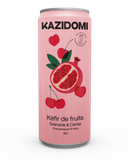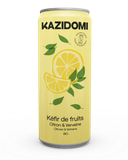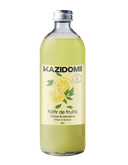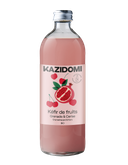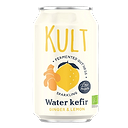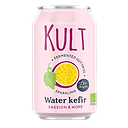The kefir is a traditional fermented drink that is increasingly gaining attention for its numerous health benefits. This ancient drink is known to improve digestion, strengthen the immune system, and balance the gut microbiota. But its virtues don't end there. Let's explore together why it has a place in your everyday diet.
What is Kefir?
Originating from the Caucasus, kefir is made from kefir grains, a symbiotic mixture of bacteria and yeast. There are two main types: milk kefir and water kefir (or fruit kefir).
- Milk kefir: Made from fermented milk, it resembles a liquid yogurt but is richer in probiotics. The kefir grains contain symbiotic microorganisms that convert lactose into lactic acid, making it a more digestible drink for those with lactose intolerance. 99% of the lactose present is indeed broken down.
- Water kefir: This variant is made by fermenting kefir grains in sugary water. After 24 to 48 hours of fermentation, a sparkling, tangy drink is produced, which is, of course, lactose-free.
Benefits of Kefir
1. Improved Digestion
Thanks to its richness in probiotics, kefir promotes healthy digestion and helps balance the gut microbiota. By strengthening the intestinal flora, it reduces digestive discomfort such as bloating, constipation, or diarrhea, and supports proper gut transit. Milk kefir can even contain up to 10 times more probiotics than regular yogurt, while a 250 ml glass of fruit kefir can contain up to 2.5 billion microorganisms.
2. Strengthening the Immune System
Kefir contains beneficial bacteria that stimulate immune system activity. It specifically enhances defense mechanisms such as the production of macrophages and the maturation of CD4+, CD8+, and B lymphocytes. It also helps reduce the expression of pro-inflammatory molecules (cytokines). Moreover, research shows that kefir might exhibit antiviral activity against various viruses (Zika, H1N1, hepatitis B and C, Herpes, etc.). Therefore, kefir may help mitigate excessive immune responses, such as the cytokine storm seen in some COVID-19 patients.
3. Low Sugar Content
The preparation of fruit kefir (or water kefir) involves a mixture of water, sugar, and fruit kefir grains. The grains contain microorganisms (yeasts and bacteria) that ferment the sugary water, transforming it into a sparkling, mildly tangy drink.
In 48 hours, approximately 66 to 80% of the sugar is consumed by the yeasts and bacteria, which significantly reduces the sugar content. It then becomes a far less sugary effervescent drink compared to the initial liquid, making kefir an ideal alternative to sodas.
4. Anti-Inflammatory Properties
The kefir is unpasteurized and contains live probiotics and digestive enzymes that help combat inflammation in the body. Additionally, water kefir, made from fruits, is rich in antioxidants. It's a real boost to our daily diet, enriching our intake of anti-inflammatory compounds.
Milk Kefir or Water Kefir?
While both types of kefir offer similar health benefits, they have different uses in cooking and unique compositions:
- Milk kefir is creamy and can be used as a base for sauces, pancakes, or cakes. It perfectly replaces milk in recipes or yogurt in desserts.
- Water kefir is lighter, sparkling, and refreshing. Ideal as a daily drink or as an ingredient in a mocktail, it’s a must-have for aperitifs and makes a perfect substitute for sodas.
Kefir vs. Kombucha, What’s the Difference?
Although kefir and kombucha are often compared, they have notable differences: kombucha is made from fermented sweet tea, while kefir comes from the fermentation of sugary water (for water kefir) or milk. Kombucha requires 7 to 14 days to ferment, whereas water kefir only takes 24 to 48 hours. Lastly, kefir contains a wider variety of beneficial bacteria, particularly lactobacilli, which are essential for gut health, and it is often less sweet than kombucha.
Discover Kazidomi's New Kefirs
Kazidomi now offers a selection of [unpasteurized water kefirs]https://www.kazidomi.com/fr/nouveaux-produits in original and delicious flavors:
- Pomegranate & Cherry
- Lemon & Verbena
Available in 250 ml cans or 75 cl glass bottles, these kefirs are made in France and contain no added sugar. They combine health and pleasure, while respecting the environment with their recyclable packaging.
Conclusion
Whether milk or water kefir, kefir is a valuable asset for your well-being. Thanks to its probiotics, it improves digestion, strengthens the immune system, and helps maintain balance in the gut microbiota. Its versatility in the kitchen makes it an essential ingredient for a healthy diet. Don’t hesitate to try our new unpasteurized kefirs to enjoy all the benefits of this ancient drink.
FAQ on Kefir
-
Is kefir lactose-free?
Water kefir is lactose-free, but milk kefir contains a small amount, though the fermentation process significantly reduces its content.
-
How is water kefir prepared?
Water kefir is made by fermenting kefir grains in sugary water at room temperature for 24 to 48 hours.
-
Is kefir good for health?
Yes, it is rich in probiotics and beneficial for digestion, the immune system, and the microbiota.
-
How much kefir should I drink per day?
A glass of kefir (about 200 ml) per day is sufficient to benefit from its probiotic advantages.
-
Does kefir contain sugar?
Water kefir contains sugar before fermentation, but most of it is consumed by microorganisms during fermentation. In the end, only a small amount remains.
-
Does kefir help with weight loss?
No, kefir is not a miracle slimming drink. However, it enriches the microbiota with good bacteria. A healthy microbiota helps the body in fat metabolism.
-
Is kefir good for gut transit?
Absolutely, kefir improves gut transit by balancing the intestinal microbiota.
-
Where can I buy kefir grains?
Kefir grains are typically shared by individuals or available in some health stores. For your convenience, you can buy our ready-to-drink kefir bottles.
-
Why is unpasteurized kefir better?
Pasteurization kills beneficial probiotics. Unpasteurized kefir preserves its live microorganisms, which are essential for gut health.


